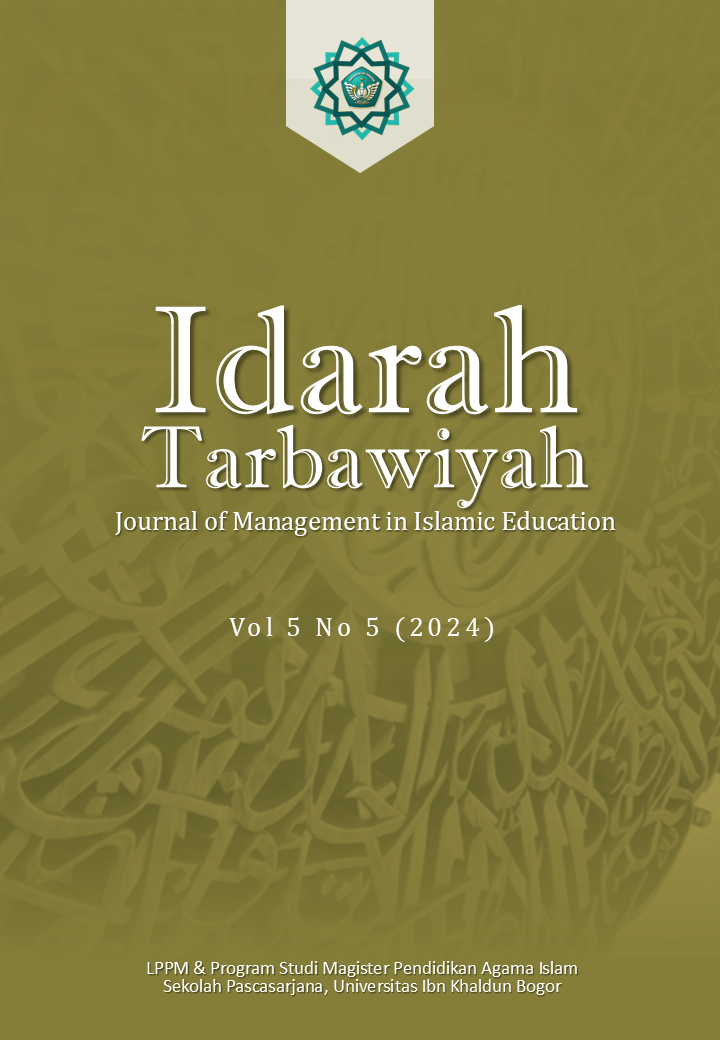Penerapan dan inovasi kurikulum berbasis masyarakat di Sekolah Markaz Ashhabul Quran
DOI:
https://doi.org/10.32832/itjmie.v5i5.17112Keywords:
Implementasi Kurikulum, Kurikulum Berbasis Masyarakat, Pendidikan Islam, Kolaborasi KomunitasAbstract
The purpose of this study focused on the Implementation and Innovation of Community-Based Curriculum at Markaz Ashhabul Quran School. This research method uses a qualitative case study that aims to explore the implementation and innovation of community-based curriculum at Markaz Ashhabul Quran school. This research will explore in depth how the curriculum is designed, implemented and assessed in the context of Islamic education. The results of this study show that the community-based curriculum at Markaz Ashhabul Quran School is effective in integrating Islamic values and the local needs of the community into students' education. Although it faces challenges in its implementation, such as managing the expectations of diverse stakeholders and maintaining a balance with national standards, the resulting benefits clearly outweigh the difficulties encountered. The relevance of this education is evident in increasing students' learning motivation and strengthening their moral and spiritual character development. Community involvement is not just an add-on but an integral foundation for the success and sustainability of education. Close collaboration between the school, community and local government is necessary to ensure relevant and meaningful education in line with the needs and aspirations of the community. The community-based curriculum at Markaz Ashhabul Quran School is not only relevant in preparing students for academic success, but also in molding them into responsible and competent leaders in an increasingly complex global society.
Abstrak
Tujuan penelitian ini difokuskan untuk Penerapan dan Inovasi Kurikulum Berbasis Masyarakat di Sekolah Markaz Ashhabul Quran. Metode penelitian ini menggunakan kualitatif studi kasus yang bertujuan untuk mendalami implementasi dan inovasi kurikulum berbasis masyarakat di sekolah Markaz Ashhabul Quran. Penelitian ini akan mengeksplorasi secara mendalam bagaimana kurikulum tersebut dirancang, diimplementasikan, dan dinilai dalam konteks pendidikan Islam. Hasil penelitian ini menunjukkan bahwa kurikulum berbasis masyarakat di Sekolah Markaz Ashhabul Quran efektif dalam mengintegrasikan nilai-nilai Islam dan kebutuhan lokal komunitas ke dalam pendidikan siswa. Meskipun menghadapi tantangan dalam implementasinya, seperti mengelola harapan beragam stakeholder dan mempertahankan keseimbangan dengan standar nasional, manfaat yang dihasilkan jelas melebihi kesulitan yang dihadapi. Relevansi pendidikan ini terbukti dalam meningkatkan motivasi belajar siswa serta memperkuat pengembangan karakter moral dan spiritual mereka. Keterlibatan komunitas bukan hanya tambahan, melainkan menjadi fondasi yang integral bagi keberhasilan dan keberlanjutan pendidikan. Kolaborasi erat antara sekolah, komunitas, dan pemerintah setempat diperlukan untuk memastikan pendidikan yang relevan dan bermakna sesuai dengan kebutuhan dan aspirasi masyarakat. Kurikulum berbasis masyarakat di Sekolah Markaz Ashhabul Quran tidak hanya relevan dalam menyiapkan siswa untuk sukses akademis, tetapi juga dalam membentuk mereka menjadi pemimpin yang bertanggung jawab dan berkompeten dalam masyarakat global yang semakin kompleks.
References
Aswinda, N. P., & Karista, Y. (2022). Dampak Implementasi Kurikulum Sekolah Penggerak Terhadap Motivasi Belajar Peserta Didik Di SMA Negeri 8 Pontianak. Juwara Jurnal Wawasan Dan Aksara, 2(1), 68–79.
Banfatin, L. (2024). Inovasi Kurikulum Berbasis Kompetensi dan Inovasi Kurikulum Berbasis Masyarakat. Jurnal Pendidikan Tambusai, 8(1), 3351–3358.
Fithriyaani, F., Yudhyarta, D. Y., & Syarifudin, S. (2021). Pengaruh Pendidikan Karakter terhadap Motivasi Belajar Siswa. Asatiza: Jurnal Pendidikan, 2(2), 138–150.
Fitriani, D., Rindiani, A., Zaqiah, Q. Y., & Erihadiana, M. (2022). Inovasi Kurikulum: Konsep, Karakteristik dan Implementasi Kurikulum Berbasis Komppetensi (KBK). Jurnal Dirosah Islamiyah, 4(2), 268–282.
Gunawan, J. (2023). Pendidikan Masyarakat Hukum Adat Pusu Melalui Sekolah Adat (studi terhadap pengelolaan sekolah adat melalui kurikulum berbasis adat). JISIP (Jurnal Ilmu Sosial Dan Pendidikan), 7(3), 2847–2855.
Halil, H., & Alfiyatin, Y. (2021). Kurikulum Dan Masyarakat. Al-Ibrah: Jurnal Pendidikan Dan Keilmuan Islam, 6(2), 54–72.
Laeli, S., Mahruddin, A., & Fazriah, D. F. (2017). Efektivitas kurikulum berbasis kemasyarakatan. Didaktika Tauhidi: Jurnal Pendidikan Guru Sekolah Dasar, 4(2), 115–125.
Nasir, M. (2009). Pengembangan Kurikulum Berbasis Madrasah. HUNAFA: Jurnal Studia Islamika, 6(3), 273–300.
Philiyanti, F., Prasetio, V. M., & Sari, L. P. (2021). Relevansi Kebutuhan Stake Holder Terhadap Pengembangan Kurikulum Berbasis Keterampilan Abad 21. Kagami: Jurnal Pendidikan Dan Bahasa Jepang, 12(2), 12–20.
Rosyid, M., & Magister, G. (2010). Relevansi Pendidikan Berbasis Masyarakat Dengan Konsep Pendidikan Islam. UIN Sunan Kalijaga Yogyakarta.
Salim, M., & Suratman, S. (2023). Implementasi Kurikulum Pendidikan Agama Islam Berbasis Masyarakat Di Kutai Lama. Sanskara Pendidikan Dan Pengajaran, 1(03), 117–125.
Setiawan, D., Aziz, S. A., & Hilman, C. (2022). Pengembangan Social dan Pembangunan Pendidikan Berbasis Masyarakat. Jurnal Inovasi, Evaluasi Dan Pengembangan Pembelajaran (JIEPP), 2(2), 74–84.
Solahudin, M. (2005). Pengembangan Kurikulum Berbasis Masyarakat di SMP Alternatif Qaryah Thayyibah Salatiga Jateng. Inovasi Kurikulum, 5(1), 55–86.
Suharto, T. (2012). Pendidikan Berbasis Masyarakat; Relasi Negara dan Masyarakat dalam Pendidikan. LKIS Pelangi Aksara.
Suttrisno, S., Riyanto, Y., & Subroto, W. T. (2020). Pengaruh Model Value Clarification Technique (Vct) Berbasis Kearifan Lokal Terhadap Motivasi Belajar Dan Hasil Belajar Siswa. Naturalistic: Jurnal Kajian Dan Penelitian Pendidikan Dan Pembelajaran, 5(1), 718–729.
Tohari, H., & Bachri, B. S. (2019). Pengaruh penggunaan youtube terhadap motivasi belajar dan hasil belajar mahasiswa. Kwangsan, 7(1), 286906.
Wulandari, Y. P., Putri, N. S., & Farahdita, D. (2019). Transformasi peran PAUD sebagai pendekatan pengelolaan lingkungan hidup berbasis masyarakat. Jurnal CARE, 4(1), 11–22.
Yuliani, N. (2020). Otonomi Pendidikan Dan Kurikulum Berbasis Kompetensi Sebagai Jawaban Atas Realitas Kekinian. ZAHRA: Research and Tought Elementary School of Islam Journal, 1(1), 8–18.
Downloads
Published
How to Cite
Issue
Section
License
Copyright (c) 2024 Yenni Fitriani, Iswantir M

This work is licensed under a Creative Commons Attribution-ShareAlike 4.0 International License.

This work is licensed under a Creative Commons Attribution-ShareAlike 4.0 International License.








